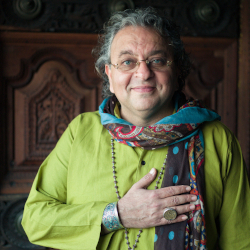Namaste Canada: A Culinary Journey from India to Canada
Oct 06, 2021
I was recently able to share some stories from my life while cooking up the perfect masala for RGF Integrated Wealth Management. I love to share memories of my journey and the recipes that I’ve learned along the way. My dream would be to make Indian cuisine as accessible as possible, so that it becomes a regular feature on Canadian dinner tables.
I want people to embrace and experiment with Indian spices, rather than being nervous about them, or worried about intensity or heat. Cooking Indian food is a bit like music; just like with different instruments or different sections of the orchestra, you take a little bit of chili, a pinch of turmeric, ginger, and garlic, and you make a tune that you love and you keep on playing, or you change up the notes and make something different each time.
Here are some of the questions (along with my answers!) that I was asked at the cooking demo:
What’s your go-to favourite dinner on a busy day?
When I’ve been in the restaurant all day, inundated by the smells and the flavours of the spices, the onions and garlic, I usually just want to go home and make a charcuterie platter or a simple salad. I love a plate with some crackers, some delicious ham and cheese, along with a sweet white wine. If someone’s coming over, of course, I’ll make more of an effort and prepare a more traditional meal, but if it’s just for myself, I want something simple and delicious to put together. And don’t forget, you need a glass of wine while you’re prepping, plus a glass of wine when you’re eating! I like to take the time to talk to people when I’m relaxing at home with those I love, so I prefer to keep the cooking simple, and maximize the time with family and friends.
Is it best to use fresh ingredients, like spices, or do the dried ones work just as well?
If you have the time to go and peel and chop your ginger every day – do it. Same with garlic, onions, and all the spices. But let’s be realistic – we don’t always have the time. In the “olden days” in India, it was traditionally the women of the home who would spend all day making and roasting spices, peeling and cooking everything from fresh. That doesn’t happen anymore – of course, it doesn’t! So the key is to do it the way that works for you, so you can be present with the people you’re with, and if that means buying pre-ground spices, frozen foods, whatever it takes to make it work for you, then do that.
How does food influence your spirituality, and vice versa?
I’m a chef, and I feel very connected with my spirituality – and I do find that I wake up and think, “What can I do with these ingredients, with this dish?” because I want to preserve the love of the farmer or the producer of that onion, the farmer who raised that chicken. The farmers and producers we use all pour their heart and soul into their work, so I think about, “How do I add my love of what I do, into the food … into the end product?” You need to pay respect – and feel connected to – the bounty of the land, the ocean; that becomes my spirituality.
How is cooking changing in the 21st century?
Cuisines are like rivers; they are constantly flowing and changing, and if they don’t, they become stagnant. As people go to different parts of the world and travel, cooking changes – influences play a part in travel, in experiences, in wanting others to experience what they did. For example, when the Indians went to East Africa, their cuisine and their food changed because of that. When they came to Canada, their food changed. You take the influences in, and you use what’s around you to replicate them, but by adding your own authenticity.
What have you seen change on the Vancouver food scene in recent years?
Vancouver is an amazing culinary destination. We have an ocean that produces great sustainable seafood, the Okanagan gives us great wine, we have incredible vegetables from the Fraser Valley – and I’m so pleased that we’ve embraced that, and that we’re giving credibility and attention to these places and that they have grown as a result. We are seeing more and more locally, sustainably produced foods on menus and in supermarkets, and that enables us to support these producers and to tell them that we want more of it. We need to be proud of what we’re producing in our backyard, and we should all respect our farmers. If paying a little more for that beautiful carrot, that great garlic, that juice that’s been made from those local fruits and vegetables – if that’s what it takes to get the best quality, and the healthiest product, then we should all be supporting that. ■
The views expressed are those of the author and not necessarily those of RGF Integrated Wealth Management, which makes no representations as to their completeness or accuracy.
Vikram Vij has two Vancouver-area restaurants: Vij’s on Cambie Street and My Shanti at Morgan Crossing in South Surrey. His range of spices, Vij’s For You, is currently available at select stores.

I want people to embrace and experiment with Indian spices, rather than being nervous about them, or worried about intensity or heat. Cooking Indian food is a bit like music; just like with different instruments or different sections of the orchestra, you take a little bit of chili, a pinch of turmeric, ginger, and garlic, and you make a tune that you love and you keep on playing, or you change up the notes and make something different each time.
Here are some of the questions (along with my answers!) that I was asked at the cooking demo:
What’s your go-to favourite dinner on a busy day?
When I’ve been in the restaurant all day, inundated by the smells and the flavours of the spices, the onions and garlic, I usually just want to go home and make a charcuterie platter or a simple salad. I love a plate with some crackers, some delicious ham and cheese, along with a sweet white wine. If someone’s coming over, of course, I’ll make more of an effort and prepare a more traditional meal, but if it’s just for myself, I want something simple and delicious to put together. And don’t forget, you need a glass of wine while you’re prepping, plus a glass of wine when you’re eating! I like to take the time to talk to people when I’m relaxing at home with those I love, so I prefer to keep the cooking simple, and maximize the time with family and friends.
Is it best to use fresh ingredients, like spices, or do the dried ones work just as well?
If you have the time to go and peel and chop your ginger every day – do it. Same with garlic, onions, and all the spices. But let’s be realistic – we don’t always have the time. In the “olden days” in India, it was traditionally the women of the home who would spend all day making and roasting spices, peeling and cooking everything from fresh. That doesn’t happen anymore – of course, it doesn’t! So the key is to do it the way that works for you, so you can be present with the people you’re with, and if that means buying pre-ground spices, frozen foods, whatever it takes to make it work for you, then do that.
How does food influence your spirituality, and vice versa?
I’m a chef, and I feel very connected with my spirituality – and I do find that I wake up and think, “What can I do with these ingredients, with this dish?” because I want to preserve the love of the farmer or the producer of that onion, the farmer who raised that chicken. The farmers and producers we use all pour their heart and soul into their work, so I think about, “How do I add my love of what I do, into the food … into the end product?” You need to pay respect – and feel connected to – the bounty of the land, the ocean; that becomes my spirituality.
How is cooking changing in the 21st century?
Cuisines are like rivers; they are constantly flowing and changing, and if they don’t, they become stagnant. As people go to different parts of the world and travel, cooking changes – influences play a part in travel, in experiences, in wanting others to experience what they did. For example, when the Indians went to East Africa, their cuisine and their food changed because of that. When they came to Canada, their food changed. You take the influences in, and you use what’s around you to replicate them, but by adding your own authenticity.
What have you seen change on the Vancouver food scene in recent years?
Vancouver is an amazing culinary destination. We have an ocean that produces great sustainable seafood, the Okanagan gives us great wine, we have incredible vegetables from the Fraser Valley – and I’m so pleased that we’ve embraced that, and that we’re giving credibility and attention to these places and that they have grown as a result. We are seeing more and more locally, sustainably produced foods on menus and in supermarkets, and that enables us to support these producers and to tell them that we want more of it. We need to be proud of what we’re producing in our backyard, and we should all respect our farmers. If paying a little more for that beautiful carrot, that great garlic, that juice that’s been made from those local fruits and vegetables – if that’s what it takes to get the best quality, and the healthiest product, then we should all be supporting that. ■
The views expressed are those of the author and not necessarily those of RGF Integrated Wealth Management, which makes no representations as to their completeness or accuracy.
Vikram Vij has two Vancouver-area restaurants: Vij’s on Cambie Street and My Shanti at Morgan Crossing in South Surrey. His range of spices, Vij’s For You, is currently available at select stores.
You might also be interested in...
Why do we plan?
Knowing where you are translates into knowing where you’re going, and we hope to provide every client with the trust and confidence to navigate through the waters of their financial lives.
Learn More
Popular Categories
Search Insights
Book a meeting
Schedule a meeting with an RGF Advisor.







